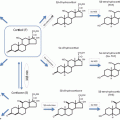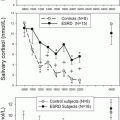Disease state
Cognitive function
Psychopathology
Coping Strategies and illness perceptions
Cushing’s syndrome or Cushing’s disease
Active or uncontrolled disease
Impaired
Major depression, anxiety disorders, acute psychosis, delirium
Not studied
Long-term remission
Subtle cognitive impairments
Maladaptive personality traits, especially: Apathy, irritability, anxiety, negative affect, and lack of positive affect
Less effective coping
More negative illness perceptions
Adrenal insufficiency
Disease manifestation
Not studied
Depression, anxiety
During Addisonian crisis: agitation, delirium, visual- and auditory hallucinations
Not studied
After long-term glucocorticoid replacement
Mild cognitive deficits
Irritability and somatic arousal, strong relation with daily hydrocortisone dose
Less effective coping
More negative illness perceptions, associated with concerns and stronger beliefs about the necessity of hydrocortisone intake
Glucocorticoid use
Not studied
Depression
Delirium/confusion/disorientation
Mania
Panic disorder
Suicidal behaviour
Not studied
References
1.
2.
McCall JG, et al. CRH engagement of the locus coeruleus noradrenergic system mediates stress-induced anxiety. Neuron. 2015;87(3):605–20.CrossRefPubMedPubMedCentral
3.
4.
5.
Karst H, et al. Mineralocorticoid receptors are indispensable for nongenomic modulation of hippocampal glutamate transmission by corticosterone. Proc Natl Acad Sci U S A. 2005;102(52):19204–7.CrossRefPubMedPubMedCentral
6.
Evanson NK, et al. Fast feedback inhibition of the HPA axis by glucocorticoids is mediated by endocannabinoid signaling. Endocrinology. 2010;151(10):4811–9.CrossRefPubMedPubMedCentral
7.
8.
9.
Klok MD, et al. A common and functional mineralocorticoid receptor haplotype enhances optimism and protects against depression in females. Transl Psychiatry. 2011;1(12), e62.CrossRefPubMedPubMedCentral
10.
11.
12.
13.
Wyrwoll CS, Holmes MC, Seckl JR. 11β-hydroxysteroid dehydrogenases and the brain: from zero to hero, a decade of progress. Front Neuroendocrinol. 2011;32(3):265–86.CrossRefPubMedPubMedCentral
14.
15.
16.
17.
Roozendaal B, McGaugh JL. Memory modulation. Behav Neurosci. 2011;125(6):797–824.CrossRefPubMedPubMedCentral
18.
19.
20.
Lambert WM, et al. Brain-derived neurotrophic factor signaling rewrites the glucocorticoid transcriptome via glucocorticoid receptor phosphorylation. Mol Cell Biol. 2013;33(18):3700–14.CrossRefPubMedPubMedCentral
21.
Datson NA, et al. Previous history of chronic stress changes the transcriptional response to glucocorticoid challenge in the dentate gyrus region of the male rat hippocampus. Endocrinology. 2013;154(9):3261–72.CrossRefPubMedPubMedCentral
22.
23.
Molendijk ML, de Kloet ER. Immobility in the forced swim test is adaptive and does not reflect depression. Psychoneuroendocrinology. 2015;623:89–91.
24.
Dallman MF, et al. Regulation of ACTH secretion: variations on a theme of B. Recent Prog Horm Res. 1987;43:113–73.PubMed
25.
26.
Akana SF, et al. Feedback sensitivity of the rat hypothalamo-pituitary-adrenal axis and its capacity to adjust to exogenous corticosterone. Endocrinology. 1992;131(2):585–94.PubMed
27.
Sarabdjitsingh RA, et al. Stress responsiveness varies over the ultradian glucocorticoid cycle in a brain-region-specific manner. Endocrinology. 2010;151(11):5369–79.CrossRefPubMed
Stay updated, free articles. Join our Telegram channel

Full access? Get Clinical Tree





